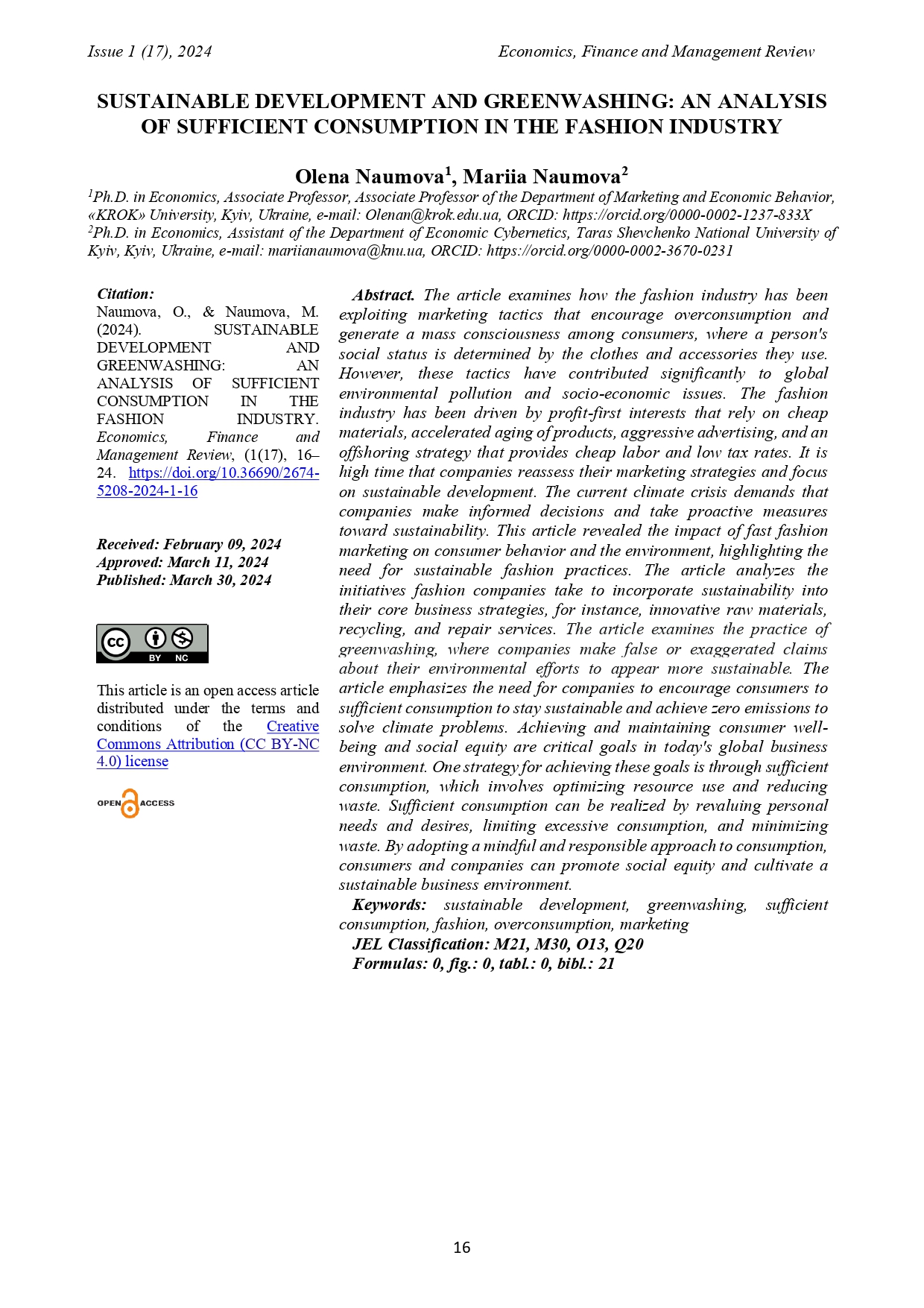SUSTAINABLE DEVELOPMENT AND GREENWASHING: AN ANALYSIS OF SUFFICIENT CONSUMPTION IN THE FASHION INDUSTRY
DOI:
https://doi.org/10.36690/2674-5208-2024-1-16Keywords:
sustainable development, greenwashing, sufficient consumption, fashion, overconsumption, marketingAbstract
The article examines how the fashion industry has been exploiting marketing tactics that encourage overconsumption and generate a mass consciousness among consumers, where a person's social status is determined by the clothes and accessories they use. However, these tactics have contributed significantly to global environmental pollution and socio-economic issues. The fashion industry has been driven by profit-first interests that rely on cheap materials, accelerated aging of products, aggressive advertising, and an offshoring strategy that provides cheap labor and low tax rates. It is high time that companies reassess their marketing strategies and focus on sustainable development. The current climate crisis demands that companies make informed decisions and take proactive measures toward sustainability. This article revealed the impact of fast fashion marketing on consumer behavior and the environment, highlighting the need for sustainable fashion practices. The article analyzes the initiatives fashion companies take to incorporate sustainability into their core business strategies, for instance, innovative raw materials, recycling, and repair services. The article examines the practice of greenwashing, where companies make false or exaggerated claims about their environmental efforts to appear more sustainable. The article emphasizes the need for companies to encourage consumers to sufficient consumption to stay sustainable and achieve zero emissions to solve climate problems. Achieving and maintaining consumer well-being and social equity are critical goals in today's global business environment. One strategy for achieving these goals is through sufficient consumption, which involves optimizing resource use and reducing waste. Sufficient consumption can be realized by revaluing personal needs and desires, limiting excessive consumption, and minimizing waste. By adopting a mindful and responsible approach to consumption, consumers and companies can promote social equity and cultivate a sustainable business environment.
Downloads
References
Zaidi, S. M. M. R., Yifei, L., Bhutto, M. Y., Ali, R., & Alam, F. (2019). The influence of consumption values on green purchase intention: A moderated mediation of greenwash perceptions and green trust. Pakistan Journal of Commerce and Social Sciences, 13(4), 826-848.
Riccolo, A. (2021). The lack of regulation in preventing greenwashing of cosmetics in the US. Journal of Legislation, 47, 133-155.
McNeill, L.S., Potdar, B., McQueen, R.H. (2023), "Prioritising sustainable garment choice among high-volume fashion consumers", Journal of Fashion Marketing and Management, Vol. ahead-of-print No. ahead-of-print. https://doi.org/10.1108/JFMM-11-2022-0229
Wren, B. (2022). Sustainable supply chain management in the fast fashion Industry: A comparative study of current efforts and best practices to address the climate crisis. Cleaner Logistics and Supply Chain, 4, 100032. doi:https://doi.org/10.1016/j.clscn.2022.100032
Berg, A., Granskog, A., Lee, L., & Magnus, K. (2020). Fashion on climate: how the fashion industry can urgently act to reduce its greenhouse gas emissions. Available at: http://surl.li/skmmb (date of access: 10.01.2024)
Alizadeh, L., Liscio, M. C., & Sospiro, P. (2024). The phenomenon of greenwashing in the fashion industry: A conceptual framework. Sustainable Chemistry and Pharmacy, 37, 101416. https://doi.org/10.30955/gnc2023.00363
Garcia-Ortega, B., Galan-Cubillo, J., Llorens-Montes, F. J., & de-Miguel-Molina, B. (2023). Sufficient consumption as a missing link toward sustainability: The case of fast fashion—Journal of Cleaner Production, 399, 136678. https://doi.org/10.1016/j.jclepro.2023.136678
Kent, S. (2020) Fashion`s Growth-Focused Business Model is not sustainable. What`s the solution? The Business of Fashion, June 28, 2023. Available at: http://surl.li/skmmi (date of access: 11.01.2024)
Keeble, B. R. (1988). The Brundtland report: Our common future. Medicine and war, 4(1), 17-25.
Borowy, I. (2013). Defining sustainable development for our common future: A history of the World Commission on Environment and Development (Brundtland Commission). Routledge.
Mukendi, A., Davies, I., Glozer, S., & McDonagh, P. (2020). Sustainable fashion: current and future research directions. European Journal of Marketing, 54(11), 2873-2909. https://doi.org/10.1108/EJM-02-2019-0132
Mango (2023) Mango commemorates 40 years with a forecast of record sales, a new expansion plan and an improved corporate governance. Available at: http://surl.li/skmlv (date of access: 08.01.2024)
Camera Nazionale della Moda Italiana (2023). Sustainable Fashion Awards 2023. Available at: https://www.cameramoda.it/media/pdf/sfa/Book_SFA_23_DIGITALE_.pdf (date of access: 08.01.2024)
HOCHUSOBITAKE (2024) About fashion Hochusobitake brand. Available at: https://hochusobitake.com/pages/about-us (date of access: 10.01.2024)
Brinjal (2024) About eco-paper brand Brinjal. Available at: https://www.brinjal.com.ua/ (date of access: 10.01.2024)
KNOWTHECHAIN (2016) Apparel & Footwear Benchmark Findings Report. Available at: https://knowthechain.org/wp-content/uploads/KTC_AF_ExternalReport_Final.pdf (date of access: 12.01.2024)
BoF-McKinsey (2023) The State of Fashion 2024. Available at: https://www.businessoffashion.com/reports/news-analysis/the-state-of-fashion-2024-report-bof-mckinsey (date of access: 11.01.2024)
Facebook (2019) How Instagram Boosts Brands and Drives Sales. Available at: https://www.facebook.com/business/news/insights/how-instagram-boosts-brands-and-drives-sales (date of access: 20.01.2024)
Laska (2024) About the charitable project “Laska”. Available at: https://laskastore.com/charity (date of access: 20.01.2024)
Islam, S. (2020). Sustainable raw materials: 50 shades of sustainability. In Sustainable technologies for fashion and textiles (pp. 343-357). Woodhead Publishing. https://doi.org/10.1016/B978-0-08-102867-4.00015-3
Adamkiewicz, J., Kochańska, E., Adamkiewicz, I., & Łukasik, R. M. (2022). Greenwashing and sustainable fashion industry. Current Opinion in Green and Sustainable Chemistry, 38, 100710. https://doi.org/10.1016/j.cogsc.2022.100710

Downloads
Published
How to Cite
Issue
Section
License

This work is licensed under a Creative Commons Attribution-NonCommercial 4.0 International License.








